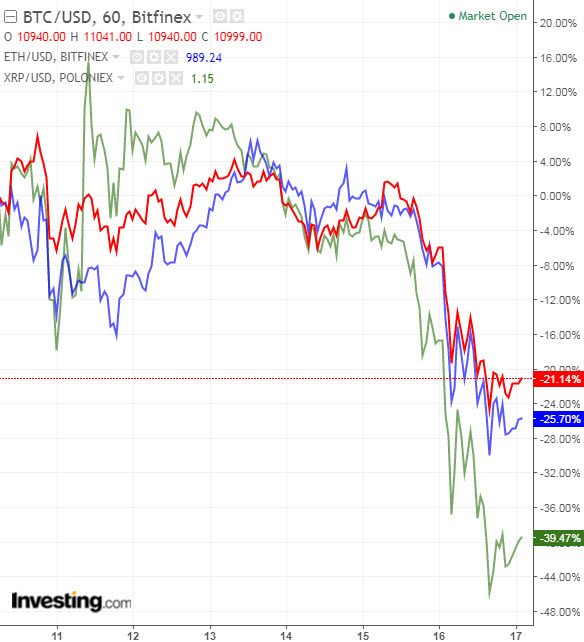During the course of this month, a number of widely traded cryptocurrencies have suffered major corrections as Asian authorities escalate their crackdown on cryptocurrency exchanges and platforms.
Cryptocurrency prices plummeted last Thursday following reports that South Korea may be preparing to ban all virtual currency trading in that country. Many were shocked by the news since Asia has been a hotbed of what has been labeled crypto fever. Others found it impossible to fathom:
Before these reports began circulating Bitcoin was trading at $14,896.00, currently it's at $11,010. Ethereum, the world’s second largest cryptocurrency by market cap, is at $994.30 having fallen from $1,248.00 and Ripple is trading at $1.15900 down from $1.92000.

This past weekend, Indonesia’s central bank issued a warning about digital currencies and urged investors to refrain from owning, selling or trading the tokens. Yesterday, additional reports emerged, this time out of China. The country is escalating its clampdown on cryptocurrency trading and targeting online platforms and mobile apps that offer exchange-like services, Bloomberg reports.
Despite the escalation of government scrutiny, markets appear to have reacted selectively. Susan Zhou, who is based in Hong Kong and is COO of Qlink, a decentralized mobile network, points out that not all cryptocurrencies have experienced major corrections.
“Selective tokens even rise 10 times during the fifteen days of the first month of 2018. The value of a token or cryptocurrency is built on the project, hinging on the implementation, partnership, commercial usage and of course the team's market capability. We will see several outstanding tokens perform this year. Judging from the timeline of all product launching, developing, and employment, we will be another bullish year in 2018.”
Zhou believes that Asian governments are playing it safe. Following China's actions she foresees additional countries issuing stricter cryptocurrency trading standards.
"I think it is an opportunity for certain countries to build a robust regulation as a model. The cryptocurrency market and blockchain technologies are the new soft power for each economy where they should be supportive and fight for instead of cutting off. A thorough understanding and proper regulation would be more appropriate. We look forward to seeing more improvements.”
China too controlling?
One critic believes the Asia crackdown is having a negative impact on its markets. Sergei Sevriugin, CEO and founder of risk-sharing platform REGA says that it is unfortunate for the cryptocurrency community that “China plans to control cryptocurrencies in the same way as they do with the Internet.” Sevriugin points out that China was a huge market for crypto and ICOs, and for the last several months that has declined due to the efforts of governmental authorities.
Alex Mashinsky, founder and CEO of Celsius Network drills down a bit deeper, and points to some of the reasons this may be happening now. He explains that for many years miners have abused China's subsidized electricity prices to gain a virtual monopoly on proof of work mining.
“Recently the Chinese government has decided to crackdown on this abuse as crypto mining does not add to Chinese industrial GDP which was the reason the government is subsidizing electricity in the first place. This development is good for the crypto community as it forces miners to move to other locations where clean hydropower is abundant and available.”
Mashinsky notes that rumors like this have circulated before and it is natural for governments to want to exercise their control over this new and largely unregulated market. He adds that while trying to outright ban cryptocurrencies is both counter-productive and futile, legitimate players in the cryptocurrency world welcome government regulation and guidelines since that will bring clarity and stability to the markets.
What are China’s motives?
Scott Nelson, CEO of Sweetbridge, a platform which allows users to lend money to themselves against existing assets via smart contracts, explains that China wants to find ways to control its currency flow while preventing alternative markets from developing that could create non-taxable trade.
According to Nelson, recent actions make perfect sense for a centrally-planned economy that fears losing control. He believes this will likely not prove effective in the long term. In the short term, adds Nelson, there is a lot of money tied up in cryptocurrency in China, which will have to find someplace to go. Current strictures are unlikely to have more than a temporary effect on cryptocurrency valuations.
Says Mashinsky:
“We will have to wait and see what China's ultimate motives are over the coming weeks and months, as it appears they're not focused on individual P2P transactions. Rather, they're looking to curb tax evasion, speculation and money laundering.”
Where does that leave investors who are considering cryptocurrency investments in the meantime? HODL or hold back and wait for clearer regulatory policies to be adopted? Nelson says:
“These are complex markets, and any prediction is likely to affect short term sentiment because it is a market that most investors don't understand. With doomsayers on one side and crypto-fanatics on the other, some people are nervous because they don't know who to believe, and this makes the market more volatile.”
It's inevitable that governments will eventually get involved in regulating how digital currencies are traded, he concludes, if for not other reasons than tax revenue realization and buyer protection.,
